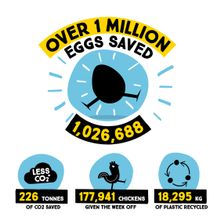 27 Apr 2021
27 Apr 2021
It's no secret that we need to make changes to what we eat if we are going to sustain the planet for the future. Research published by Mintel highlights that half of consumers view reducing consumption of animal products as a good way to reduce their impact on the planet.1
Since launching into supermarkets just under 18 months ago, OGGS® has saved 1,026,688 eggs and over 226 tonnes of CO2 by using aquafaba in its cake ranges and selling aquafaba vs. eggs. This is the same as driving around the world 22 times.2*
The demand for egg alternatives is rising and sales of meat-free food in the UK are set to exceed £1.1 billion by 2024 according to market research data released last year.3 The UK dairy alternatives market is also set to double in value to $705.30 million4 2025. (£507.65 million)
It is not just the rise in popularity of the flexitarian diet that has helped drive demand for meat-free products. One of the companies meeting that demand is the market-leading challenger brand, OGGS®. A values-based company that measures its success in the amount of CO2 saved, reduced water waste, and the number of chickens who can have a day off.
Hannah Carter founder of OGGS® comments “OGGS® is committed to finding ways to remove unnecessary and often hidden animal products from the food chain. To do this we are starting by making eggless cooking and baking accessible to as many people as possible: This is a change for home-bakers, caterers, and large-scale manufacturers by swapping eggs for a plant-based liquid egg alternative; aquafaba.
So far, we have been successful in giving 177,941 chickens a week's holiday. We realised if we want the big manufacturers to stop using barn eggs in their products, we need to provide a cost-efficient, bulk solution that provides consistent and stable results.”
In 2020, OGGS® launched its flagship product OGGS® Egg Alternative Aquafaba onto the shelves of three major retailers across the country. The UK's first liquid egg alternative whisks, binds, and emulsifies just like an egg. It has a long shelf life and is available to buy in a ready-to-pour 200ml carton, which is the equivalent of four eggs.
In a study of 9,000 consumers that currently buy and consume eggs, 52% declare that they are looking for an alternative product. Of that 52%, 46% of those people expressed that their needs were for health-related or dietary reasons.5
Hannah continues “we set about finding the highest performance aquafaba recipe that performs in a way that is indistinguishable from its rival, the egg. A no mess, no fuss, healthy and sustainable alternative that removes all barriers so it is no longer a question of “why change?” it will be a case of “what's stopping you?”.
The negative impact on the sustainability of our planet is not just driven by the standalone animal products, but also by the hidden animals in our supply chain that are being used on a mass scale. Each year in the UK 1.5 billion eggs are being used in prepared products that sit on supermarket shelves: everything from gluten-free bread and own-label bakery items to sandwiches and quiches.6 That's 2.1 million tons of CO2, the annual CO2 consumption of Manchester, Belfast, and Cardiff combined.7
But what about eggs?
With their high protein content and inexpensive price point, egg production has increased in recent decades to meet consumer demand. According to data, 13 billion eggs are currently consumed in the UK every year.8 As with other intensively produced items, this high production rate generates a negative effect on the environment. Research shows that in the production of just 12 eggs 2.7kg of CO2 is created.9 20% of the eggs produced in the UK are used not for their nutritional or taste value but are used by the foodservice industry in some of the nation's favourite food items like cakes, mayonnaise, pancakes, or Yorkshire puddings.10
So, maybe it's time to ask ourselves, what comes first the planet or the egg?
Amy@sharprelations.com or Jo@sharprelations.com
2 https://www.carbonindependent.org/17.html
3 https://www.plantbasednews.org/news/-uk-vegan-meat-sales-1-1-billion-2024
5 Independent survey conducted by OGGS® 2020.
7 www.carboncalculator.co.uk/averages.php
8 https://www.egginfo.co.uk/egg-facts-and-figures/industry-information/data
9 https://phys.org/news/2018-04-environmental-footprint-egg-industry.html
10 https://www.egginfo.co.uk/egg-facts-and-figures/industry-information/data
Editor's Notes
500,000 eggs = 0.287kg CO2 CO2 per egg
500,000 x 0.287 = 143,500 kg CO2
https://www.carbonindependent.org/17.html
*Small car uses 0.4kg of CO2 per mile.
100 tonnes = 100,000 kg
Divide the total CO2 by the amount of CO2 used per mile we get total number of miles.
100,000/0.4 = 250,000 miles
If you could drive around the world at its widest point it is a total distance of 25000 miles.
Divide the total miles you could travel on 100 tonnes of CO2 (250,000) by the circumference of the earth:
250,000/25,000 = 10 times around the world.




